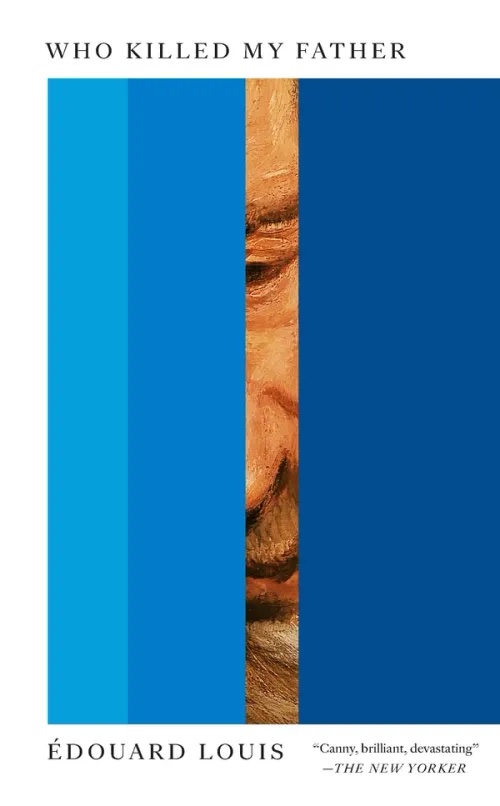
[New Directions; 2023]
Tr. from the French by Lorin Stein
“Before I had a chance to rebel against the world of my childhood, that world rebelled against me.” So begins The End of Eddy, Édouard Louis’s 2014 debut novel about a gay boy growing up in a working-class family in Northern France. This autofictional novel, with its direct, lyrical prose and political conviction, turned twenty-something Louis into a global sensation. After selling 300,000 copies in less than a year, The End of Eddy became a New York Times bestseller and was successfully adapted for the stage. Who Killed My Father is a memoir, an overlapping companion piece to the author’s first book. Lorin Stein’s translation captures the stark poetry of Louis’s voice, which finds the beauty in simplicity. The book’s title can easily be mistaken for a question, but is very much a statement of intent. Édouard Louis’s father is not dead, but the political ruling class in France have, in one way or another, killed him. And Louis intends to name names.
The End of Eddy is dedicated to the French philosopher and writer Didier Eribon, and Louis’s writing openly recalls Eribon’s own landmark memoir, Returning to Reims (2013). Like Louis, Eribon is a gay man from a working-class background; like him, he understands the immense power of society to deliver judgment and shape personal destiny. “We’re all subjected to social verdicts,” says Eribon in an interview with Electra Magazine in 2021. In the case of Who Killed My Father, the social verdict referenced is not the homophobia depicted by Louis in The End of Eddy, but the verdict given to Louis’s father, by the state. A verdict against the poverty and pain of class violence. Written as a letter to his father, Louis’s slim memoir is both an act of love for a father and an act of hate for the politicians who ruined him. The “killing” of Louis’s father began with the impoverishment and violence he experienced in childhood and continued with his socially determined path, ending in physical disarray—all orchestrated by France’s ruling elite.
In his own letter to his father, Franz Kafka writes: “The result of this method of upbringing was that I fled from everything that remotely reminded me of you.” Louis had a similar trajectory, leaving the Northern town of his youth, where being gay brought shame to his family, and escaping to Paris. In the opening of Who Killed My Father, we learn that Louis has not seen his father in many years. “You belong to the category of humans whom politics has doomed to an early death,” writes Louis, referencing his father’s deteriorating health. As with much else, Louis lays the blame for his father’s ill health on the failures of the government. What unfolds are the twin stories of his father’s working-class upbringing in Northern France and Louis’s own troubled childhood at the hands of this man.
“Poverty was all you knew,” says Louis, describing his father’s earliest years with a drunk and abusive father who walked out, leaving his uneducated mother with seven children to care for and no job to pay the bills. “It’s hard to describe your life with anything but negative terms,” says Louis. Louis felt the ripple of his father’s childhood in his own. “I spent my childhood longing for your absence,” he says of his father. On one occasion, at a family dinner, Louis decides to put on a show with the other children, dressing up as a girl and singing in front of the adults. His father looks away. No matter how hard Louis tries to get his attention, his father ignores him, eventually leaving the room: “I had hurt your feelings,” Louis tells his father, understanding now why he was ignored. In his father’s world, masculine pride dealt out rules that had to be obeyed: “Be a man, don’t act like a girl, don’t be a faggot.”
His father, fueled by anger and shame, would insult and abuse a young Louis, but he could also be considerate and understanding, suggesting a different kind of man was lurking somewhere beneath the tough, working-class facade. When Louis asked for a copy of the movie Titanic for his birthday, his father was appalled: “Wouldn’t you prefer a remote-control car?” But he bought the movie and a collector’s edition book to go with it, which was more than he could afford. Louis never excuses his father’s actions but does not blame him, either. He was handed a verdict at birth and by the time he was an adult, Louis tells him, “You no longer had expectations, nothing was violent because violence wasn’t what you called it, you called it life.”
Édouard Louis is unique among the plethora of autobiographical novelists and memoirists working today in that he is a deeply political writer. His writing is activism, exposing the political underpinnings of people’s lives, particularly, the victimization of the working class. Writing of the American novelist Ben Lerner for The New York Times, Giles Harvey claims that, “Autofiction, with its resolution to speak only for the authorial self, risks dead-ending in solipsism.” This is precisely what Louis avoids by using fiction and memoir to switch between personal reflection and wider political implications. He uses his own interior life not as a means to an end, but to expose the impact of a violent exterior world.
When Louis’s father suffers a terrible accident at the factory where he works, crippling him for months and initiating a slow decline in his health, Louis blames the policies of France’s ruling elite. According to Louis, Jacques Chirac’s decision to limit certain state-provided medication “destroyed your intestines.” Sarkozy’s restrictions on unemployment benefits, forcing his father to take manual jobs miles from his home, “broke your back all over again.” The list goes on, until Louis asks: “Why do we never name these names?” These, according to Louis, are the people who killed his father. “I want to inscribe their names in history, as revenge.”
Louis tells the story of his father, not for sentimental or even personal reasons, but to highlight the damage caused by those wielding political power. In an interview with The Guardian, Kim Willsher suggested to Louis that Who Killed My Father might be a love letter to his father. “I don’t think so,” he says, “I have to admit I don’t know if I love my father or not. But it’s not the point—the violence is the point. When I write about politics and ask questions, I don’t ask if I love the person I’m writing about or if they love me.” This is not a memoir about family divisions or reconciliation—it is a highly politicized account of the bullied poor in French society. Louis is a young, white, working class, gay writer. “I grew up in a small village in Northern France, where there are only white people, where unemployment is very high because the factories have disappeared, where alcoholism is the refuge against misery, and where the extreme right wins at every election,” wrote Louis in The Paris Review in 2018. He fled, but refuses to ignore this community, exposing their racism, misogyny, and homophobia but also the ways in which they are brutalized, too. He writes, he says, “to make them listen to us.” To this end, Who Killed My Father is wonderfully loud.
Simon Lowe is a British writer. His stories have appeared in EX/Post, Breakwater Review, AMP, Akashic Books online, Ponder Review, and elsewhere. His novel, The World is at War, Again, was published June 2021 (Elsewhen Press).
This post may contain affiliate links.







